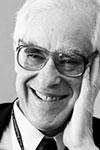
Stewart Adelson, M.D., is an adult, child and adolescent psychiatrist at Columbia and Cornell and a Senior Visiting Fellow at Yale Law School. He is founding Director of the Youth Equity Science/YES Project, a collaboration of legal, human rights, and public health experts to reduce LGBT youth mental health disparities. He was a 2014-15 Clinical Research Scholar at Harvard Medical School. He is author of translational and integrative research, public health and psychodynamic publications for underserved populations, including the American Academy of Child & Adolescent Psychiatry's Practice Parameter for LGBT youth. He has served as Medical Director in public psychiatry-oriented clinical programs for youth. He is a member of the Group for Advancement of Psychiatry, the American College of Psychiatrists, and the LGBT Advisory Committee of Human Rights Watch.

Alexandra Bacopoulos-Viau, Ph.D., (abv233@nyu.edu) is a cultural historian whose work centers on the interactions between the “mind sciences” (psychiatry, psychology, psychoanalysis) and broader cultural developments from the late nineteenth century to the present. Her first book project, entitled Scripting the Mind: Technologies of Writing and Selfhood in Modern France, is based on her doctoral work at the University of Cambridge. The book traces the rise of various models of the mind that emerged in France prior to and during the so-called Freudian revolution. Specifically, it highlights the role played by certain writing practices in the making of modern subjectivity. Dr. Bacopoulos-Viau has taught at Cambridge, Harvard, NYU, and McGill, and has edited, with Aude Fauvel, a special issue of Medical History on the history of psychiatry from the patient’s perspective. She currently teaches at New York University.

Michael Beldoch, Ph.D., is Clinical Professor of Psychology in Psychiatry at Weill Cornell Medical College.

Samantha Boardman, M.D., (svboardm@med.cornell.edu) is Clinical Assistant Professor of Psychiatry and Clinical Instructor in Medicine at Weill Cornell Medical College.

Daria Colombo, M.D., is Clinical Associate Professor of Psychiatry, Weill Cornell Medicine.

Katherine Dalsimer, Ph.D., is Clinical Professor of Psychology in the Department of Psychiatry, WCM, and is on the faculty of the Columbia University Center for Psychoanalytic Training and Research. At the DeWitt Wallace Institute of Psychiatry, she is the coordinator of the Working Group on the Humanities. She is the author of Virginia Woolf: Becoming a Writer (Yale University Press, 2001) and Female Adolescence: Psychoanalytic Reflections on Literature (Yale University Press, 1986). Most recently, she contributed a chapter entitled “Encountering Invisible Presence: Virginia Woolf and Julia Duckworth Stephen” to the forthcoming Cambridge Companion to Literature and Psychoanalysis (Cambridge University Press, 2021).

Aaron Esman, M.D., is Professor Emeritus of Clinical Psychiatry, Weill Cornell Medicine.

Joseph J. Fins, M.D., M.A.C.P., F.R.C.P., (jjfins@med.cornell.edu) is the E. William Davis, Jr., M.D. Professor of Medical Ethics and Chief of the Division of Medical Ethics at Weill Cornell Medical College, where he is a Tenured Professor of Medicine, Professor of Medicine in Psychiatry, Professor of Medical Ethics in Neurology, Professor of Medical Ethics in Rehabilitation Medicine, and Professor of Health Care Policy and Research. He is the founding Chair of the Ethics Committee of New York-Presbyterian Weill Cornell Medical Center where he is an Attending Physician and Director of Medical Ethics. A member of the Adjunct Faculty of Rockefeller University and Senior Attending Physician at the Rockefeller University Hospital, he co-directs, the Consortium for the Advanced Study of Brain Injury (CASBI) at Weill Cornell Medicine and Rockefeller. In 2015, he was appointed the Solomon Center Distinguished Scholar in Medicine, Bioethics and the Law at Yale Law School and directs CASBI@YLS. Dr. Fins is an elected Member of the National Academy of Medicine (formerly the Institute of Medicine) of the National Academy of Sciences, a Fellow of the American Academy of Arts and Sciences, and an Academico de Honor (Honored Academic) of the Real Academia Nacional de Medicina de España (the Royal National Academy of Medicine of Spain). He is a graduate of Wesleyan University and Cornell University Medical College.

Lawrence Friedman, M.D., is on the Faculty of the Psychoanalytic Association of New York (formerly, the Institute for Psychoanalytic Education affiliated with the NYU Medical School). He has written on psychoanalytic theories and technique and is author of The Anatomy of Psychotherapy, (Analytic Press, 1988) and Freud’s Papers on Technique and Contemporary Clinical Practice (Routledge, 2019). He is on the Editorial Board of Psychoanalytic Inquiry, is an editorial consultant to Psicoterapia e Scienze Umane, and serves on the Advisory Board of the Loewald Center. He is a member of the Center for Advanced Psychoanaytic Studies in Princeton, and the Rapaport-Klein Research Group in Stockbridge. He holds a Sigourney Award.

Richard Friedman, M.D., (rafriedm@med.cornell.edu) is Professor of Clinical Psychiatry and the Director of the Psychopharmacology Clinic at Weill Cornell Medical College in New York. He is an expert in the neurobiology and treatment of mood and anxiety disorders and has done research in depression. He is actively involved in teaching and training psychiatric residents and is director of the biological psychiatry curriculum in the department. Dr. Friedman has a keen interest in mental health policy and the social and cultural implications of current psychiatric practice. He has published on a wide range of topics in The New England Journal of Medicine, The American Journal of Psychiatry, and The Journal of the American Medical Association. He is also a contributing opinion writer at the New York Times where he writes on mental health, addiction, human behavior, and neuroscience. Outside of the office, he is an avid long-distance swimmer and classical pianist.

William A. Frosch, M.D., is DeWitt Wallace Senior Scholar in Psychiatry and Professor Emeritus of Psychiatry at Weill Cornell Medical College.

Robert Goldstein, M.D., is Clinical Instructor in Psychiatry at Weill Cornell Medical College.

L.C. Groopman, M.D., Ph.D., is Clinical Assistant Professor of Medical Ethics in Medicine and a Clinical Assistant Professor of Psychiatry at Weill Cornell Medical College.

Curtis Hart, M.Div., (cuh9001@med.cornell.edu) is an ordained Episcopal priest who has spent the majority of his professional ministerial career as a hospital department head in chaplaincy and spiritual care, first at Toledo Mental Health Center, Toledo Ohio and later at Weill Cornell Medical Center. His articles and reviews have appeared in, among other venues, the Journal of Pastoral Care and Counseling and the Journal of Religion and Health. He has served on the editorial board for both publications and later became the Editor in Chief of the Journal of Religion and Health. At present, Rev. Hart is a member of the Institutional Review Board Committee on Human Rights in Research at Weill Cornell Medicine, a member of the Institutional Animal Care and Use Committee at Hunter College, and a member of the Board for Professional Medical Conduct of the State of New York. He is a member of the Columbia Advanced Study Group on Psychoanalysis, Religion, and Spirituality and a participant in the Working Group on Psychoanalysis and the Humanities at the Institute of Psychiatry.

Dagmar Herzog, Ph.D., (dherzog@gc.cuny.edu) is Distinguished Professor of History and Daniel Rose Faculty Scholar at the Graduate Center, City University of New York, where she teaches courses in European history, with a special focus on Nazism and the Holocaust, gender and sexuality, history of religion, and history of psychoanalysis. Herzog is the author of seven books, including Unlearning Eugenics (Wisconsin, 2018); Cold War Freud (Cambridge, 2017); Sexuality in Europe (Cambridge, 2011); and Sex after Fascism (Princeton, 2005). She has also edited and coedited multiple anthologies, most recently The Routledge Companion to Sexuality and Colonialism (Routledge, 2021). Her current project is on the theology and politics of disability in Germany, 1900-2020.

Anne Golomb Hoffman, Ph.D., (hoffman@fordham.edu) is a Professor of English at Fordham University. Her research in recent years looks at representations of embodiment in literary and psychoanalytic writing, and the relationship between trauma and narrative. Her articles and reviews have appeared in psychoanalytic and literary journals. Professor Hoffman holds a research appointment in the Institute for the History of Psychiatry at Weill Medical College of Cornell University. From 2013 to 2017 she directed the Richardson Seminar in the History of Psychiatry at Weill Cornell. She is a special member of the Association for Psychoanalytic Medicine of the Columbia University Center for Psychoanalytic Training and Research, where in 2017 she delivered the Liebert Award Lecture in Psychoanalysis and the Arts. She has published extensively on the politics of gender in Israeli and European Jewish writing. Prof. Hoffman is also an accomplished painter.

Siri Hustvedt, Ph.D., (Jen.dougherty07@gmail.com) has a Ph.D. in English literature from Columbia University. She is the author of a book of poetry, seven novels, four collections of essays, and two works of nonfiction. She has published papers in various academic and scientific journals and is the recipient of numerous awards, including the International Gabarron Prize for Thought and Humanities (2012). Her novel, The Blazing World, was nominated for the Man Booker Prize and won The Los Angeles Book Prize for Fiction (2014). In 2019, she received an American Academy of Arts and Letters Award for Literature; the European Essay Prize for The Delusions of Certainty, an essay on the mind-body problem; and The Princess of Asturias Prize for Literature. Her work has been translated into more than thirty languages. She lives in Brooklyn, New York.
Ben Kafka, Ph.D., L.P., is an associate professor of clinical psychoanalysis in the Department of Psychiatry at Columbia’s Vagelos College of Physicians and Surgeons. Originally trained as a historian, he co-directs the DeWitt Wallace Institute's working group on the history of the mind sciences. He is the author of The Demon of Writing: Powers and Failures of Paperwork (Zone Books, 2012) as well as several dozen articles, essays, and reviews. He’s currently working on a book for Random House that returns to mid-century psychoanalysis and psychodynamic psychiatry for new insights into how people drive each other crazy. Dr. Kafka received his B.A. from Brown, his Ph.D. in History from Stanford, and his clinical training from the Institute for Psychoanalytic Training and Research (IPTAR), with additional training through the Melanie Klein Trust. He sees patients in private practice in Greenwich Village.

Nathan Kravis, M.D., (nkravis57@gmail.com) is Associate Director of the DeWitt Wallace Institute of Psychiatry at Cornell. He is also Clinical Professor of Psychiatry at Weill Cornell Medical College, Training and Supervising Analyst at the Columbia University Center for Psychoanalytic Training and Research, and a former Associate Editor of the Journal of the American Psychoanalytic Association. He is the author of On the Couch: A Repressed History of the Analytic Couch from Plato to Freud (MIT Press, 2017; Gradiva Award, 2018; German and Turkish editions, 2018; Russian edition, 2019). Other recent publications include “The Analyst’s Hatred of Analysis” (Psychoanalytic Quarterly, 2013), “Fuck Redux” (Journal of the American Psychoanalytic Association, 2013), and “The Googled and Googling Analyst” (Journal of the American Psychoanalytic Association, 2017). He is the recipient of teaching awards from the psychiatry residents at Cornell and psychoanalytic candidates at Columbia, the George E. Daniels Merit Award of the Association for Psychoanalytic Medicine (2011), the George S. Goldman Award of the Columbia Psychoanalytic Center (2015), and the Cooper Award from the Department of Psychiatry at Weill Cornell Medicine (2020). He has been in private practice in New York since 1987.

George J. Makari, M.D., (gjmakari@med.cornell.edu) is Director of Cornell’s DeWitt Wallace Institute of Psychiatry: History, Policy, and the Arts, and Professor of Psychiatry at Weill Medical College. Of Fear and Strangers: A History of Xenophobia (W.W Norton, 2021), his third book, was preceded by two widely acclaimed histories, Soul Machine: The Invention of the Modern Mind (W.W Norton, 2015) and Revolution in Mind: The Creation of Psychoanalysis (HarperCollins, 2008). His opinion pieces and essays have appeared in the New York Times, the Massachusetts Review, the Los Angeles Review of Books, The Boston Globe, and Time, in addition to his many articles in psychiatric journals. The recipient of numerous honors, in 2017 Dr. Makari was presented with the Benjamin Rush Award from the American Psychiatric Association. A graduate of Brown University, Cornell University Medical College, and the Columbia University’s Psychoanalytic Center, he is presently a Guest Investigator at Rockefeller University and a faculty member of Columbia’s Psychoanalytic institute. He lives with his family in New York City.

Robert Michels, M.D., (rmichels@med.cornell.edu) is Walsh McDermott University Professor of Medicine at Cornell University, and University Professor of Psychiatry at Weill Medical College of Cornell University. He served as the Stephen and Suzanne Weiss Dean of Cornell University Medical College and Provost for Medical Affairs of Cornell University from 1991 to 1996, and as the Barklie McKee Henry Professor and Chair of the Department of Psychiatry, Cornell University Medical College, and Psychiatrist-in-Chief of The New York Hospital, Payne Whitney Clinic and Westchester Division from 1974 to 1991. He is a past President of the American Board of Psychiatry and Neurology, past President of the American College of Psychiatrists, past President of the American Association of Chair's of Departments of Psychiatry, and a former member of the Board on Mental Health and Behavioral Medicine of the National Academy of Sciences, Institute of Medicine. Dr. Michels is the author of more than 350 scientific articles.

Doris B. Nagel, M.D., is a Clinical Associate Professor of Psychiatry at Weill Cornell Medicine.

Orna Ophir, Ph.D., (ornaophir@nyu.edu) is Associate Director of the DeWitt Wallace Institute of Psychiatry at Cornell, as well as a psychoanalyst in private practice. She holds a Ph.D. from the Cohn Institute for the History and Philosophy of Science and Ideas at Tel Aviv University and teaches at Gallatin School for Individualized Studies at NYU. Ophir taught at the Humanities Center at JHU (2015-2017) and at the Doctoral Studies in Clinical Psychology at LIU (2013-2015). She is the author of Psychosis, Psychoanalysis and Psychiatry in Postwar America (Resling, 2013; Routledge, 2015). Ophir was selected to give the Frieda Fromm-Reichmann Memorial Lecture at The Washington Center for Psychoanalysis (2011) and was a runner up of the Tyson Award (IPA, 2013). As a clinician, she worked at Shalvata Mental Health Center affiliated with the School of Medicine at Tel Aviv University (1992-2008). Her new book Schizophrenia: An Unfinished History will be published by Polity in 2022.

Camille Robcis, Ph.D., (car2129@columbia.edu) is Professor of French and History at Columbia University. She specializes in modern European intellectual history, with a focus on nineteenth- and twentieth-century France. Prior to coming to Columbia, she taught at Cornell for ten years. Robcis is the author of Disalienation: Politics, Philosophy, and Radical Psychiatry in Postwar France (Chicago, 2021), which traces the history of institutional psychotherapy through the lens of Marxism and Lacanian psychoanalysis. Her earlier book, The Law of Kinship: Anthropology, Psychoanalysis, and the Family in France, won the 2013 Berkshire Conference of Women Historians Book Prize. Robcis is currently working on a new project, tentatively titled The Gender Question:Populism, National Reproduction, and the Crisis of Representation, in which she tries to make sense of the protests against the so-called “theory of gender” that have raged in various parts of the world since the 1990s, especially in their conceptual links to populism.

Louis Sass, Ph.D., (lsass@rutgers.edu) is Distinguished Professor, Department of Clinical Psychology, Graduate School of Applied and Professional Psychology, at Rutgers University—where he is also affiliated with the Comparative Literature Program and the Center for Cognitive Science. Sass is the author of Madness and Modernism: Insanity in the Light of Modern Art, Literature, and Thought and of The Paradoxes of Delusion: Wittgenstein, Schreber, and the Schizophrenic Mind. Sass has received fellowships from the National Endowment for the Humanities, the Institute for Advanced Study, and the Fulbright Foundation, and has long been a fellow of the New York Institute for the Humanities. He has received various awards for his contributions to theoretical and philosophical psychology. A revised edition of Madness and Modernism, published by Oxford University Press, was awarded the BMA: British Medical Association First Prize as best book in the field of psychiatry for 2018.

Theodore Shapiro, M.D., is Professor of Psychaitry at Weill Cornell Medicine.

Nirav Soni, Ph.D., (Niravsoniphd@gmail.com) is an advanced candidate in adult psychoanalysis at the Columbia University Center for Psychoanalytic Training and Research. He supervises residents at Payne Whitney and co-directs the Rush Fellowship in the History of Psychiatry at IoP. He also participates in the Working Group on Psychoanalysis and the Humanities and the Working Group on the Mind Sciences. He is in private practice, where he sees adults, children, and couples.

Paul Stepansky, Ph.D., (info@keynote-books.com) is a Yale-trained historian of ideas specializing in the history of American medicine and psychiatry, who served as Managing Director of The Analytic Press, Inc., from 1983 to 2006. Stepansky’s scholarship has taken him from history of psychoanalysis; to interdisciplinary studies in medicine and psychiatry; to historical critiques of psychoanalysis in relation to medicine. Over the past decade he has concentrated on the history of primary care medicine in America in the 19th and 20th centuries. Publications include a memoir of his father, William Stepansky, M.D., The Last Family Doctor (2011) and In the Hands of Doctors: Touch and Trust in Medical Care (2017), winner of the Independent Publisher Book Awards Bronze Medal. Most recently, Stepansky has turned to the professionalization of American nursing practice, a theme explored in Easing Pain on the Western Front: American Nurses of the Great War and the Birth of Modern Nursing Practice (2020). Since 2012, Stepansky has written over 50 essays on the shaping impact of medical history on contemporary health care on his blog, Medicine, Health, and History.

Rosemary Stevens, Ph.D., M.P.H., (stevensrosemarya@gmail.com) is DeWitt Wallace Distinguished Scholar in Social Medicine and Public Policy, Department of Psychiatry, Weill Cornell Medicine; Emeritus Professor and former chair of History and Sociology of Science, and former Dean of Arts and Sciences, at the University of Pennsylvania. She is a member of the National Academy of Medicine and the American Academy of Arts and Sciences and has chaired multiple studies and national committees. Her most recent book, A Time of Scandal: Charles R. Forbes, Warren G. Harding and the Making of the Veterans Bureau, proved that though Forbes had many faults, he was not the villain portrayed in the “Harding scandals” of the 1920s. Instead, Forbes, the director of the huge U.S. Veterans Bureau, acquired a fictional role in a good moral tale. Published at the beginning of the Trump administration, A Time of Scandal reminds us that today’s contested stories, themes, and “facts” are the soil for tomorrow’s “history.” Currently, Dr. Stevens is exploring other examples of mythmaking while continuing to pursue her longtime interests in the history of American medicine and of the British National Health Service.

Peter Wilson, M.D., is Professor Emeritus of Clinical Psychiatry at Weill Cornell Medicine.

Megan J. Wolff, Ph.D., M.P.H., (mew2008@med.cornell.edu) is a policy researcher and administrator at the Institute of Psychiatry, where she is Chair of the series on Issues in Mental Health Policy and Coordinator of the Richardson Seminar on the History of Psychiatry. In addition to writing white papers on policy issues, she serves as a member of the Advisory Board for the Rogers Health Policy Colloquium, and is a member of the Cornell Center for Health Equity.


